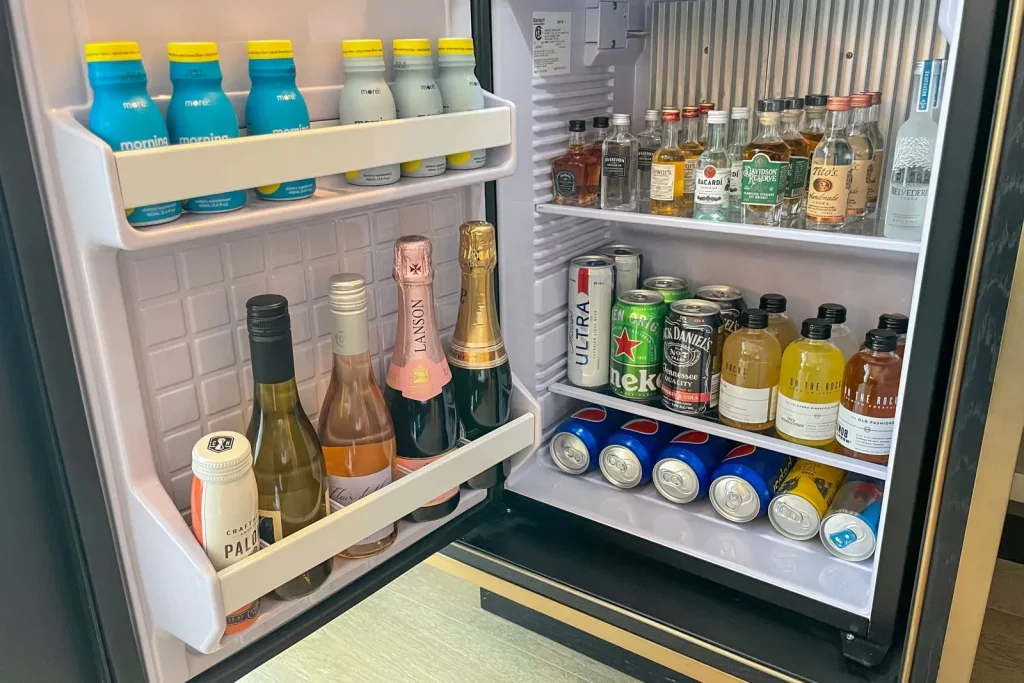Hotel minibars have long been associated with the convenience and indulgence that travelers enjoy after a long day, but their significance has drastically changed over the years. Once a staple of in-room luxury, these compact refrigerators stocked with drinks and snacks are now facing challenges in modern hospitality. With shifts towards guest convenience and cost-effectiveness, savvy hotels are exploring minibar alternatives like contactless hotel services and smart minibars that enhance user experience. Instead of traditional minibars, many establishments are embracing partnerships with hotel delivery apps to meet the evolving demands of their guests, allowing for more personalized options right at their fingertips. As the future of hotel amenities continues to transform, the once ubiquitous minibars may soon become a nostalgic memory.
In-room refreshment options have evolved significantly, prompting a reexamination of traditional beverage methods in hotels. The once-familiar sight of stocked mini-refrigerators is being replaced by innovative solutions tailored to guest needs, where advanced technology plays a pivotal role. With the rise of intelligent hospitality solutions, modern guestrooms now feature smart refrigeration units that cater to individuals while minimizing operational headaches for hotels. Additionally, the emphasis on guest-centric services is leading many properties to explore alternatives, including partnerships with popular hotel delivery services that promise swift and seamless access to a variety of refreshments. This shift not only enhances the overall guest experience but also reflects the hospitality industry’s commitment to adapting to new consumer preferences.
The Decline of Traditional Hotel Minibars
Traditional hotel minibars, once a staple feature in guest rooms, have seen a significant decline in popularity in recent years. Initially introduced as a luxury convenience, these in-room refrigerators provided quick access to snacks and beverages but became less feasible for hotels due to high operational costs. Factors such as the constant need for stocking, food spoilage, and the risk of theft made traditional minibars a logistical challenge. As hotel management began to reconsider their operational strategies, the cost-to-benefit ratio of maintaining minibars became untenable.
The shift away from traditional minibars was especially noted in larger hotel chains, which found that the resources allocated to their upkeep could be redirected towards more profitable ventures. Many hotel brands have witnessed positive guest feedback after removing minibars and have opted instead for streamlined solutions that enhance guest convenience and satisfaction. This shift illustrates how the hospitality industry is continually evolving to meet changing consumer expectations, with an increasing focus on practical and cost-efficient amenities.
Innovative Alternatives to Hotel Minibars
As traditional minibars face decline, hotels are turning to innovative alternatives that cater to modern consumer habits. Smart minibars are one such solution, equipped with technology that tracks inventory and usage in real time, allowing for more efficient management. However, the adoption rates remain modest, with only 33% of guests utilizing these smart options. Rather than relying solely on this technology, hotels are actively exploring partnerships with delivery apps, ushering in a new era of convenience for guests.
Services such as DoorDash and Uber Eats are becoming increasingly popular as hotels collaborate with these platforms to offer an expansive range of food and drink choices delivered directly to guest rooms. This contactless service not only minimizes operational expenses but also enhances the accessibility of options for guests. Leveraging these modern technology-driven solutions ensures that hotels can provide a more personalized experience, accommodating diverse tastes while keeping operational costs in check.
The Role of Contactless Services in Modern Hospitality
In response to shifting consumer preferences, the hotel industry has embraced contactless services that enhance guest convenience and safety. With rising demands for minimal person-to-person contact, hotels are implementing systems that allow guests to order food, beverages, and amenities through their smartphones. This technological trend facilitates a seamless experience, reducing wait times and improving overall satisfaction.
Contactless systems, including self-service kiosks and hotel delivery apps, have gained traction as convenient alternatives to the traditional hotel minibar experience. These systems not only cater to the desire for efficiency but also align with the growing trend towards health and safety considerations. By providing guests with contactless options, hotels can ensure a pleasurable stay while adapting to the current hospitality landscape.
How Smart Minibars are Reshaping Guest Experience
Smart minibars represent a fusion of traditional hospitality and modern technology, aiming to enhance the guest experience without the burdensome management of conventional minibars. These innovative devices provide real-time tracking and automatic inventory management, allowing hotels to better respond to guests’ needs. The advantages include reduced labor costs and improved satisfaction, as guests can enjoy a variety of options without the delays typically associated with refill processes.
Although the uptake of smart minibars has been relatively modest, the emergence of these alternatives is a reflection of the evolving hotel industry. By marrying convenience with technology, hotels are able to offer more tailored experiences that cater to the preferences of today’s travelers. This shift signifies a move towards a more integrated approach where guest experiences are prioritized through seamless technology, and traditional amenities are reimagined to align with contemporary preferences.
Rethinking Hotel Food and Beverage Offerings
As hotel chains pivot away from traditional minibars, there’s a notable shift towards reimagined food and beverage offerings that cater to contemporary traveler needs. Boutique and upscale hotels are leading the charge, often providing personalized minibar selections featuring locally sourced products. This approach not only enhances the guest experience but also supports local businesses, creating a unique offering that appeals to eco-conscious travelers.
Meanwhile, mainstream hotels are increasingly partnering with third-party services to expand their food and beverage options beyond the confines of minibars. Strategic alliances with delivery apps allow guests to enjoy a broader selection of dining choices, all within the comfort of their rooms. By focusing on flexibility and variety, hotels are adapting their offering to meet the diverse preferences of guests, ultimately redefining in-room dining experiences.
Luxury and Boutique Hotels: The Future of Mini Bars
While mainstream hotels have largely phased out traditional minibars, luxury and boutique hotels have found a way to keep this amenity alive by rethinking its purpose. These establishments often curate bespoke minibar selections that reflect local flavors and artisanal products, offering a personalized touch that enhances the guest experience. This strategic approach transforms the minibar into a unique selling point, enticing guests to enjoy premium offerings that they wouldn’t find in standard hotel rooms.
Moreover, luxury hotels are integrating smart technologies into their minibar systems, combining convenience with upscale service. This includes self-minibar options that are stocked based on guest preferences and previous purchases, ensuring that visitors feel catered to from the moment they check in. As trends continue to evolve, it is clear that the future of minibars in boutique hotels lies in offering personalized experiences that resonate with guests seeking both convenience and luxury.
The Convenience of Hotel Delivery Apps
With the rise of hotel delivery apps, guests now have access to a wide variety of food and beverage options from the comfort of their rooms. This trend addresses one of the major criticisms of traditional hotel minibars, which often had limited selections and high prices. By partnering with popular delivery services, hotels can offer guests a much more extensive menu to choose from, including local restaurants and favorite eateries.
This growing trend not only fulfills the demand for diverse dining options but also provides a level of convenience that traditional minibars could never achieve. As mobile technology becomes increasingly central to guest interactions, hotels that embrace delivery apps are likely to see enhanced guest satisfaction and loyalty. Thus, the advent of hotel delivery apps is reshaping the way travelers experience food and beverage services when staying away from home.
Benefits of Modernizing Hotel Services
Modernizing hotel services, particularly in relation to food and beverage offerings, yields significant benefits for both guests and hotel operators. By moving away from traditional minibars towards contactless and delivery service options, hotels can streamline operations and reduce costs. This shift not only addresses the logistical challenges associated with minibar management but also provides hotel guests with a customizable experience that caters to their specific needs.
Furthermore, embracing technology such as smart minibars and delivery applications enhances the overall guest experience, positioning hotels as forward-thinking establishments attentive to changing consumer preferences. As travelers increasingly prioritize convenience and personalized service, hotels that successfully modernize their offerings will likely enjoy a competitive edge in the hospitality market. By focusing on guest convenience, hotels can foster loyalty and satisfaction, ultimately translating into positive reviews and repeat business.
The Future Trajectory of Hotel Amenities
As the hotel industry continues to evolve, it is highly likely that the concept of amenities will undergo significant transformations. Traditional features like minibars are fading away in favor of more innovative solutions geared toward enhancing guest convenience and overall satisfaction. The future trajectory of hotel amenities will undoubtedly focus on providing a seamless experience for guests by integrating technology and services designed to meet their changing preferences.
Additionally, hotels may also experiment with variable pricing models or subscription services that grant frequent travelers access to curated food and beverage offerings without the constraints of traditional minibar options. By embracing these evolving models, hotels can redefine what it means to provide comfort and luxury for their guests, ensuring they stay competitive in the fast-paced hospitality landscape.
Frequently Asked Questions
What are the main reasons hotel minibars are declining in popularity?
Hotel minibars are declining in popularity due to high operational costs, logistical challenges in restocking, food spoilage issues, and theft. Many hotel chains have found that the expenses associated with maintaining minibars exceed their revenue potential.
How have smart minibars changed the traditional minibar experience?
Smart minibars have introduced technology that tracks usage in real time, allowing for efficient inventory management and reducing the risk of theft. Despite this innovation, usage rates remain modest, with only about 33% of guests taking advantage of them.
What are some alternatives to hotel minibars for guest convenience?
Hotels are turning to minibar alternatives such as contactless lobby marketplaces, hotel bars, and partnerships with food delivery apps like DoorDash and Uber Eats to enhance guest convenience. These options often provide a wider selection of food and drink at competitive prices.
Can I still find minibars in luxury hotels?
Yes, while many mainstream hotels are phasing out minibars, boutique and luxury hotels often reimagine the minibar concept by providing personalized, locally sourced items that cater to their guests’ preferences and enhance the overall experience.
What role do hotel delivery apps play in replacing traditional minibars?
Hotel delivery apps play a crucial role in replacing traditional minibars by offering guests the convenience of ordering food and drinks directly to their rooms with no delivery fees. Partnerships between hotels and delivery services enhance the guest experience and cater to their preferences for a broader selection.
Are hotel minibars still a viable revenue source for hotels?
Hotel minibars have become less of a viable revenue source for many hotels due to the high costs of maintenance and low usage rates. Many hotels are exploring alternatives that offer better profitability, such as contactless hotel services and online ordering through delivery apps.
| Key Point | Details |
|---|---|
| Introduction of Minibars | Hotel minibars were first introduced in 1974 at a Hilton in Hong Kong, inspired by airline bar carts. |
| Impact on Sales | Drink sales increased by 500% that year, contributing to a 5% rise in overall revenue for Hilton. |
| Logistical Challenges | Restocking, spoilage, operational costs, and theft made minibars difficult for hotels to manage. |
| Removal from Hotels | By the early 2000s, many chains started removing minibars, with the Marriott Marquis in Times Square removing most of their minibars in 2004. |
| Staffing Issues | Maintaining minibars required significant staff resources; e.g., the Marriott needed eight full-time employees for 150 minibars. |
| Introduction of Smart Minibars | Smart minibars track usage, yet only 33% of guests use them with an average daily transaction of $12. |
| Modern Alternatives | Hotels are focusing on alternatives like contactless marketplaces, hotel bars, and partnerships with delivery apps. |
| Boutique Hotel Trends | Some boutique and luxury hotels are reinventing minibars with personalized offerings. |
Summary
Hotel minibars have undergone a significant transformation from their peak in the 1990s to now. They were once a symbol of convenience for travelers, offering late-night snacks and drinks at the tip of a finger. However, due to the logistical challenges and high operational costs associated with maintaining them, many hotels have started to phase them out. Modern innovations and partnerships with delivery services are emerging as viable alternatives, allowing hotels to adapt to the changing needs of guests. While minibars may still exist in some boutique settings, their prevalence in mainstream hotels is diminishing, signaling a shift towards more practical solutions for guest refreshments.



